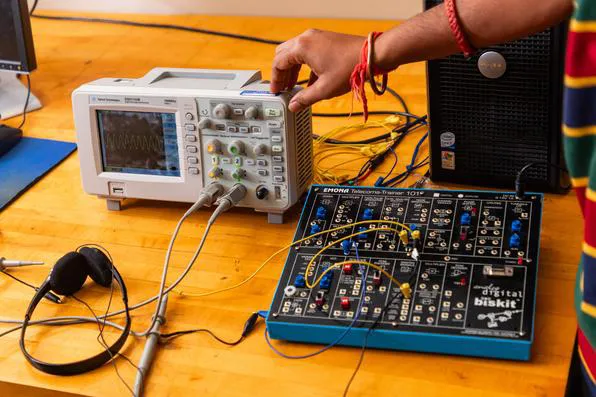Main Content
Doctor of Philosophy in Electrical and Computer Engineering

Our program provides students with rigorous training in the foundational concepts and methodologies of electrical and computer engineering for specialized research areas. It aims to empower graduates with the skills to independently conduct significant research and effectively communicate their findings and research proposals, ensuring they can contribute to the advancement of their field with clarity and precision.
Students can delve into a variety of study areas, including Biomedical Engineering, Communications, Computer Engineering, Control Systems, Nanoscale and Quantum Electronics, Electromagnetics, VLSI, Networks, Optics and Photonics, Power Systems, and Signal Processing.
Degree Requirements
Our Program is meticulously structured to ensure an in-depth postgraduate experience.
For those entering with a Master's degree, the journey involves 50 credit hours post-Master's, including 26 credit hours from advanced (500/400 level) courses and 24 from dissertation work. Essential to this path are 12 credit hours of specialized 500-level ECE courses, 3 credit hours in math, science, or engineering, and an ECE seminar.
For direct-entry or accelerated PhD candidates, the requirement is 80 credit hours beyond the Bachelor's degree, with a similar distribution of advanced coursework and dissertation credits, including 18 credit hours of 500-level ECE courses.
In both tracks, selections from outside the ECE domain are welcomed upon approval, with a cap on online courses. Core courses from a Master's program may count towards these requirements, ensuring that every student builds a robust foundation to advance in their chosen research area, in line with Graduate School standards
![]() View all of the requirements for the Doctor of Philosophy Electrical and Computer Engineering degree.
View all of the requirements for the Doctor of Philosophy Electrical and Computer Engineering degree.
Qualifying Examinations
Once the foundational coursework is complete, PhD candidates are eligible to attempt the qualifying examination. This pivotal assessment has both a written and oral segment. Candidates must first assemble an examining committee, which includes ECBE faculty members and potentially the School Director.
The written test spans three key ECBE areas, with committee members contributing questions. Following this, within a fortnight, the oral examination is conducted. A minimum score of 75% is required in each area of the written test, and the oral responses must be satisfactory. Candidates have a maximum of two opportunities to pass the exam, held typically in early February and September by the ECBE Graduate Studies Committee.
Contact Information
Spyros Tragoudas,
Director
Engineering E-202B
1230 Lincoln Dr
Carbondale, IL 62901
618-453-7027
spyros@engr.siu.edu
Shannon Oxendine,
Office Manager
Engineering E-202A
1230 Lincoln Dr
Carbondale, IL 62901
618-536-2364
shannon.oxendine@siu.edu




